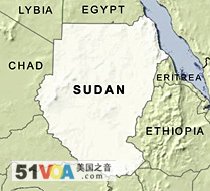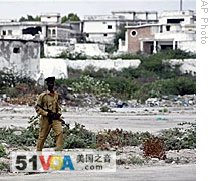Nairobi
13 May 2009
A new report says that the same cargo companies that fly weapons into African conflict zones are often contracted by international agencies to supply humanitarian and peacekeeping operations. The report says the problem has been particularly troubling in Sudan.
According to the report by the Stockholm International Peace Research Institute - a prominent think tank that monitors international arms transfers - 90 percent of air cargo companies linked to arms trafficking have also been used by United Nations agencies, Western governments or international non-governmental organizations to transport humanitarian aid.
 |
"These aircraft and helicopters are painted white and have the U.N. logos put on them for U.N. flights to support peacekeeping missions primarily through logistics. But, then, when the U.N. is finished using these companies, the companies don't remove the white paint nor the U.N. logos and, instead, contract their aircraft to be used by Sudanese army and police, sometimes in a ground attack role," he said.
Griffiths also points out that many of the air cargo companies operating in Sudan are controlled by member of Sudan's political and military class, who are making money from both the conflict and the aid operations.
According to the report, similar problems are present in other parts of East Africa. In eastern Democratic Republic of Congo, humanitarian agencies regularly use companies linked to warlords involved in mining activities. In Somalia, the American private security company Dyncorp - which was contracted by the U.S. government to support the African Union peacekeeping mission - has used a cargo company that is accused of supplying weapons to Al-Shabab, a hardline Islamist militia with ties to Al Qaeda.
 |
| A Somali policemen guards the airport in Mogadishu (file photo) |
"Were the international community as a whole, as part of a coordinated effort, to set criteria saying we are not going to use companies that the U.N. recommend for a complete ban anymore, then you would find the market kicking in and just like we find restaurants near most conflict zones which serve good food in a clean kitchen because of the demand for that from the internationals, so you would find airlines operating safer aircraft which have a good code of conduct, an ethical transportation policy and a track record of not violating United Nations arms embargoes. You have to create a market for such companies," he said.
The report recommends instituting new ethics requirements for carriers doing business with Western governments, U.N. agencies, or international NGOs. The authors also say that existing safety requirements in Europe and the United States could be applied to carriers accused of transporting arms, many of which have poor safety records.